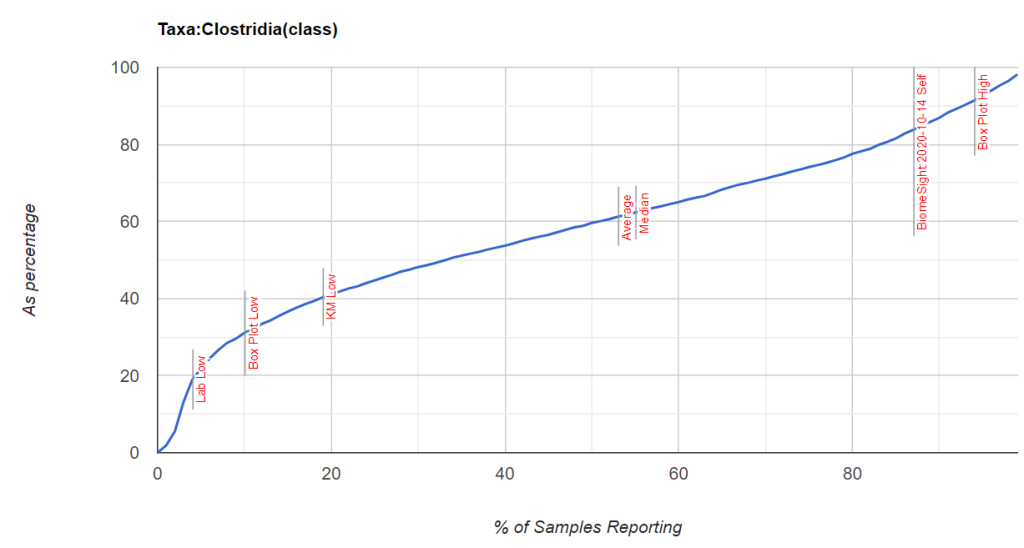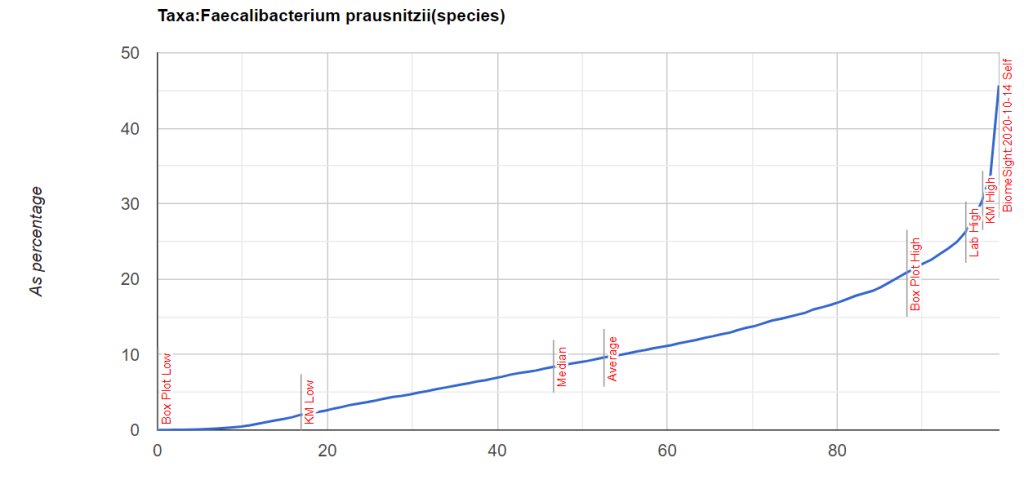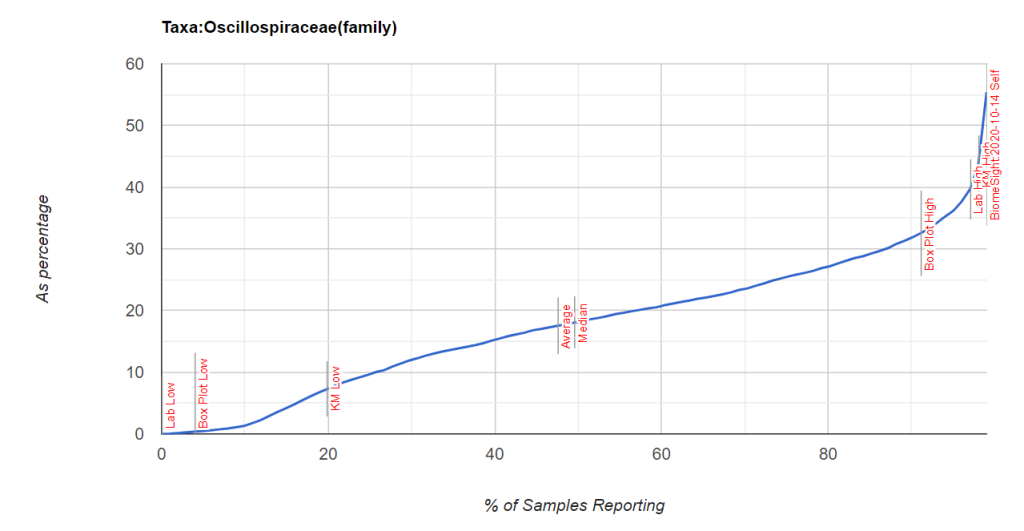Autism is a variety of conditions caused by DNA mutations, environmental influences and a host of other factors. A significant contributor can be the microbiome. This impact can be further amplified because many children with autism are picky eaters shifting the microbiome further. What is discussed in this post applies to this child and not autistic children in general.
Back Story
A son with autism. He had COVID in April 2021. With autism, it can be challenging to identify long COVID symptoms from autism symptoms. “We have seen marginal improvements in his receptive language and command following. His social skills and emotional understanding is poor . His diet has largely remained the same , vegetables and chicken , lamb, beef or fish and spices. He is verbal but not conversational, does not sleep well at night, does stimming throughout the day, his understanding is minimal He has very good energy levels and is playing till he sleeps on most days. He has very good memory and learn preferred topics quickly but is unable to focus on any task , he is unable to write or hold pencil for long . He cannot always reply to questions and has ecolalia[unsolicited repetition of utterances made by others] . ”
Analysis
Lookin at Percentages of Percentiles, I see a different pattern than seen with ME/CFS and Long COVID — my most frequent analysis types. He has statistically (between 2 and 5%) significant abnormalities, but far less than people with ME/CFS and Long COVID.

Looking at Potential Medical Conditions Detected we see that ADHD and Mood Disorders patterns are there. Everything is reasonably in range for Dr. Jason Hawrelak Recommendations with two significantly out of range (too low) is Akkermansia (which is available as a probiotic) and Faecalibacterium prausnitzii is too high (27%). This pattern is seen across all of his samples.
Going over to our Citizen Science Special studies, the top three pattern matches are for:
- COVID19 (Long Hauler)
- Autism
- Brain Fog
These also are seen with an earlier sample from 2020.
Plan for Suggestions
Since this is a persistent state with reasonable continuity across samples, I am going to go the Uber-Consensus route. By this I mean we will do for Each Sample:
- “Just Give Me Suggestions” which executes 4 algorithms
- Citizen Science using Autism
Then we combine the suggestions from each sample into one, an uber suggestion consensus. The advantage of this approach is to minimize minor fluctuations of the microbiome over time. This means that we have 20 sets of suggestions combined.

I was disappointed with the results — nothing was consistently suggested. I experimented and found that the last two samples gave more consistent results. This implies that there has been significant changes in the microbiome over the last two years.
The top suggestions from the PDF are below
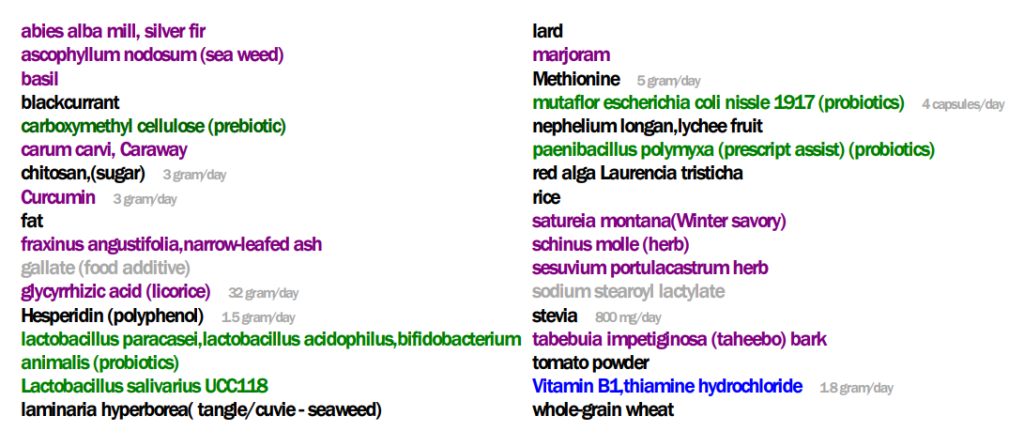
As a FYI, in terms of how many times things were suggested:
- blackcurrant – all 10
- low-fat diets – all 10
- red alga Laurencia tristicha – all 10
- lard – all 10
- Methionine – all 10
- fat – all 10
- glycyrrhizic acid (licorice) was 9 for and 1 against
I should talk a bit about the apparent contradiction with low-fat diets vs lard and fat. These come from the terms that clinical studies used. Low fat diet tends towards fish and poultry, lard is a pork product – I speculate that the type of fat may be significant.
On the flip side, we have these avoids. One item seems to be to suggest gluten free (despite wheat being a to-take):
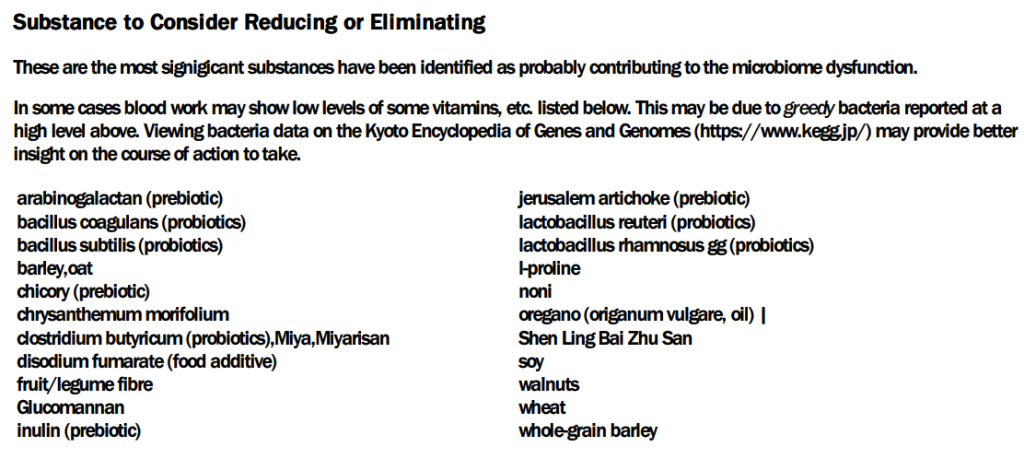
As an experiment/learning activity — I looked at some of the suggested prescription items and checked if any are used for autism. We are matching these items impact on the microbiome and the shifts that this person has (autism as a diagnosis was not considered).
- cycloserine – D‐cycloserine for autism spectrum disorder [2019]
- Bumetanide – Bumetanide for autism: Open‐label trial in six children [2021]
- cefixime – Beta-Lactam Antibiotics as A Possible Novel Therapy for Managing Epilepsy and Autism, A Case Report and Review of Literature [2015]
- chlorpromazine hydrochloride – The Pharmacological Treatment of Autistic Spectrum Disorders [2014]
Since the non-prescription items above should cause similar shifts (and likely with less risk of side effects), it appears that the algorithms are making reasonable suggestions.
The process of checking suggestions derived exclusively from the microbiome against clinical studies for a condition is called cross-validation. When there is a high percentage of agreement, it implies that the mechanism may be via the microbiome and generating candidate substance from the microbiome may produce good results.
KEGG Based Suggestions
These use data from Kyoto Encyclopedia of Genes and Genomes to try to identify substances that the microbiome and the body may be short of which can be obtain via supplements or probiotics.
- Probiotics (in decreasing priority)
- Escherichia coli – which can be Mutaflor (recommended above) or Symbioflor-2 (which is easier for people in the US to get).
- There were several items that are counter-indicated from the suggestions – when there is disagreement, don’t gamble — ignore
- Akkermansia muciniphila – low positive score but also identify as low on Dr. Jason Hawrelak Recommendations
- Supplements (again double checking across suggestions and keeping only that both agree with)
- Biotin, Vitamin B7
- Arginine
- Glutamine
- N-Acetyl Cysteine (NAC),
Questions
Q: His gut according to the test is in good condition. I have heard in the past from one of his doctors that his Gut results were one of the best that he has seen in Autistic children, but we have not been able to make a considerable shift in his symptoms in the last few years.
- A: My working hypothesis is simple: symptoms are associated to microbiome shifts. He has bacteria shifts that are matches to autism drugs (see above); so I believe further improvement of the gut and behaviors are possible and probable. He may be good; I believe he can be better.
Q: Faecalibacterium prausnitzii is high in my son , I have read it works as anti-inflammatory , but on the contrary I have heard that children with ASD have an inflamed Brian ,I would have thought this would have worked in his favor.
- A: Excellent question! Faecalibacterium prausnitzii is anti-inflammatory for Crohn’s disease[2008], colitis [2013]. I was unable to find any clear literature on its effect on the brain. I did found some information that cause me to suspect that it does not impact the brain significantly.
- “A 15kDa protein with anti-inflammatory properties is produced by F. prausnitzii, a commensal bacterium involved in CD pathogenesis. This protein is able to inhibit the NF-κB pathway in intestinal epithelial cells and to prevent colitis in an animal model.” [2017] – the size of this is very important.
- “Most proteins in the plasma are not able to cross the blood—brain barrier because of their size and hydrophilicity.” [Basic Neurochemistry]
- “does not have a barrier against molecules less than 1 kDa.. may form a barrier against molecules larger than 4 kDa” [2020]
- Bottom Line — it appears the chemical produced by Faecalibacterium prausnitzii may be too big to reach the brain.
- We also find the following reported, suggesting we want to reduce it to a normal range, you should independently research this
- “Faecalibacterium predicted social deficit scores in children with ASD” [2018]
- “Faecalibacterium prausnitzii … were also found to be highly correlated with Autism Treatment Evaluation Checklist (a measure of Autism severity )”
- On the flip side, it reduces abdominal pain and improved bowel movement in ASD [2018].
- “Gut microbiome data revealed Akkermansia sp. and Faecalibacterium prausnitzii to be statistically lower in abundance in autistic children than their neurotypical peers with a five and two-fold decrease” [2021] — which may account for the gut issues.
- “Compared with healthy controls, Faecalibacterium,..were more abundant in ASD patients” [2021]
- Your son’s range is thus very atypical being many, many times higher than expected.
- I have caution here, Faecalibacterium and cognitive issues have inconsistent reports [2021, 2023 ], Faecalibacterium is implicated in cognitive issues[2018]. IMHO, encouraging it to the normal ranges may be the wisest course.
Q: “His results are over all satisfactory ,same as last year about – Gut wellness score – 89.52. I have noticed that Clostridia is about 79.7 % could this be the reason, would appreciate your help.”
- A: Clostridia has been high in most samples, I drilled down into it’s main components
- 2023-08-21: 80% of the microbiome, 88%ile — Oscillospiraceae 89%ile, Faecalibacterium prausnitzii 96%ile
- 2022-07-11: 86% of the microbiome, 92%ile — Oscillospiraceae 94%ile, Faecalibacterium prausnitzii 95%ile
- 2021-11-29: 80% of the microbiome, 88%ile — Oscillospiraceae 79%ile, Faecalibacterium prausnitzii 79%ile
- 2020-10-14: 83% of the microbiome, 98%ile — Oscillospiraceae 100%ile, Faecalibacterium prausnitzii 100%ile
Searching for Faecalibacterium + autism on PubMed resulted in 29+ studies. There was nothing found for Oscillospiraceae + autism. Looking at the latest sample, only 10% of the organisms in Oscillospiraceae could be identified in the sample — no smoking gun for which genus. Doing a Metagenomic Shotgun Sequencing test would like provide more information (for example, Thorne) — but it is unlikely that will produce more actionable item — just give names.
Looking at what reduces Oscillospiraceae, we see Bumetanide, cycloserine, cefixime and chlorpromazine in that list (as well as many of the above suggestions).
Some visuals: Clostridia is not that extreme, but two of it’s children are.
